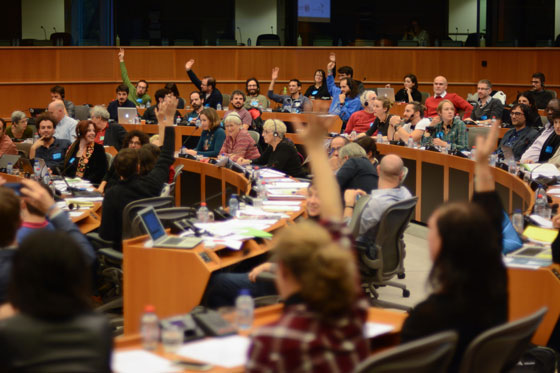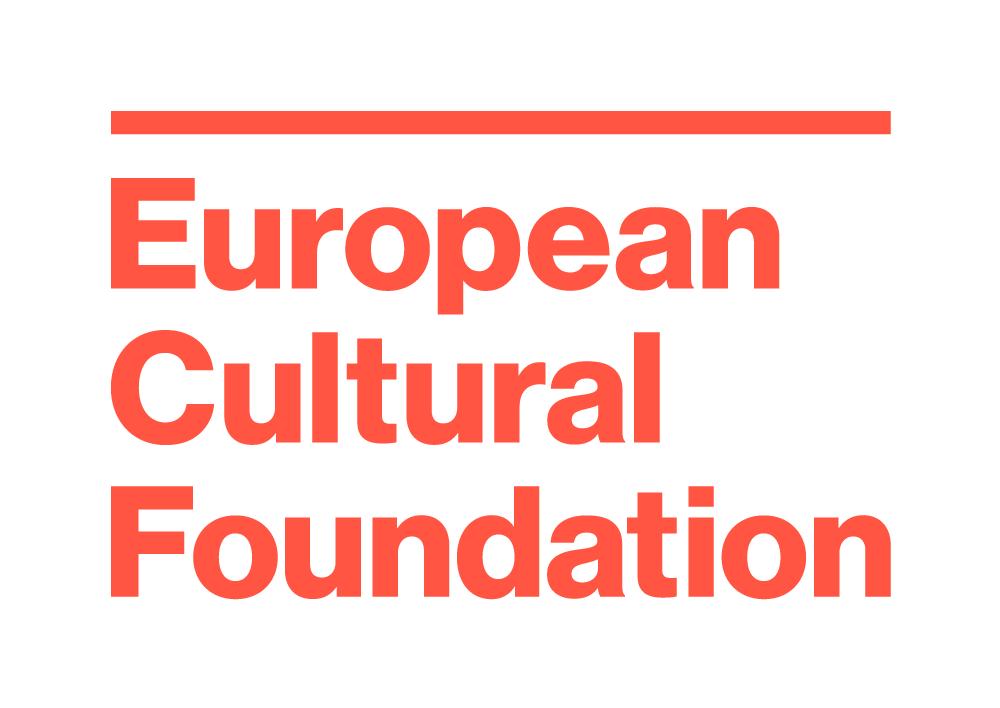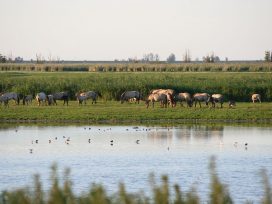How the commons can revitalize Europe
How the commons can revitalize Europe
The defence and regeneration of the commons depends both on meaningfully strengthening EU participative policy processes, and on greater responsiveness to local civic communities. Following the first European Commons Assembly, Sophie Bloemen and David Hammerstein consider current and future options for co-creation, stewardship and social and ecological sustainability.
In May 2016, the European Parliament voted on an amendment for the “recognition of energy as a common good” as part of a report about decentralized local production, the “New deal for energy consumers”. While the amendment was voted down by 298 votes to 345 votes, this vote reflects the support of almost half of Europe’s democratic representatives for seeing energy as a common good. The amendment was proposed by the Commons Intergroup, part of the European Parliament’s Intergroup on “Common goods and public services”. These comprise Members of the European Parliament from different parliamentary groups, mainly from among the Greens and the United Left (GUE/NGL), as well as several members of the Socialists & Democrats Group (S&D).

European Commons Assembly, Brussels, November 2016. Source: Flickr
In mid-November 2016, the European Commons Assembly was held in cooperation with the same Commons Intergroup in the European Parliament, to promote the establishment of creative institutions and political alternatives, from the local to the European level. In the call for the Assembly, “commoners” from throughout Europe stated: “We call upon governments, local and national, as well as European Union institutions to facilitate the defence and growth of the commons, to eliminate barriers and enclosures, to open up doors for citizen participation, and to prioritize the common good in all policies.”1
Today, however, the predominant discourses that permeate political discussions in the EU and trump all others concern economic growth, competitiveness and efficiency. The majority of EU policy is focused on macro-economic indicators and the promotion of large commercial actors. Citizens are often viewed one-dimensionally as entrepreneurs or consumers. For many Europeans and for many global citizens, the business of the EU concerns big business and big member states. There is a growing concern among citizens that decisions affecting the well-being of local communities are often driven by distant centralized institutions with other priorities. In fact, the growing feeling of lack of control is eroding confidence in our political institutions on all levels, often sparking xenophobic and nationalistic movements.
The Commons across Europe
The dominant European policy priorities contrast starkly with the commons perspective – an ethical worldview favouring stewardship, peer-to-peer cooperation, and social and ecological sustainability. The commons discourse considers people as actors deeply embedded in social relationships, communities and ecosystems. This holistic perspective also tends to overcome dominant subject-object dualisms and to consider human activity as part of the larger living bio-physical commons.
Across Europe, more and more people are co-governing and co-creating resources. Whether in small local initiatives or in larger networks, new civic and economic structures are moving beyond the rigid dichotomies of producer and consumer, commercial and non-commercial, state and market, public and private, to construct successful new hybrid projects. The commons use voluntary social collaboration in open networks to generate social-environmental value, in ways that large markets and exclusive private property rights do not and cannot. This enormous value, though it may not be monetized, nonetheless constitutes a significant part of societal well-being in academic research, energy production, nature protection, health, creative sectors, drug development and digital innovation. However it is largely ignored by EU policymakers and institutions, resulting in the atrophy of such social value-creation or, even worse, its appropriation by large investors and corporations.
Notable examples are community renewable energy, Wikipedia, permaculture, the peer-to-peer collaborative economy, distributed solidarity structures and open source software. Sometimes local commons initiatives are sparked by the scarcity created by economic crisis, or in response to political powerlessness, or just fuelled by the need for social-ecological connectedness.
Building the commons encourages EU institutions to take a more holistic ecosystemic approach by combining collaborative, participatory and egalitarian principles with concrete conditionality in favour of social cohesion and environmental objectives. The moral notion of common goods refers to goods that benefit society as a whole, and are fundamental to people’s lives, regardless of how they are governed. Certain matters will need to be claimed as common goods politically in order to manage them as commons, sustainably and equitably, whether in terms of participation, access or use. For instance, natural resources, health services or useful knowledge, or – drawing upon the above example in the European Parliament – decentralized renewable energy.
The European Union’s responsibility
Due to its central role in policy-making for all member states, and its significant budget, the European Union is well placed on many terrains to strengthen, promote and facilitate commoning activities and commons-based production. These initiatives and practices demand more flexible institutional and legal frameworks that at once prevent centralization of market-power and promote dynamic, collaborative, self-governed civic networking. This includes orienting policy to enhance the blossoming of vibrant and caring local communities. To some degree this also implies stimulating new economic identities, where an individual or group orients their economic activity towards caring for the common good of the community and its natural, social and cultural surroundings, instead of solely towards maximizing material interests.
According to a 2015 report published by the European Committee of the Regions, a “commons-based approach means that the actors do not just share a resource but are collaborating to create, produce or regenerate a common resource for a wider public, the community. They are cooperating, they are pooling for the commons”. This means helping people and communities to generate and regenerate urban, cultural and natural commons as active citizens, producers, designers, creators, care-takers, local organic farmers and renewable energy promoters. It also means embracing an open knowledge economy while promoting the internet as a digital commons based on open standards, universal access, flexible copyright rules, decentralized internet infrastructures, and democratic governance.
Knowledge policies
With regards to policies on knowledge management, the EU puts great emphasis on what one could call the “enclosure of knowledge”. This enclosure happens through the expansion of intellectual property protection, both within and outside Europe, by means of trade policies. Aside from potentially spurring innovation and helping European industries, this also results in, for instance, long patent monopolies on medicines and long copyright terms.
Copyright reform discussed in 2016 is of crucial importance to the online information commons. It will determine the boundaries of innovative social value-creation through sharing and collaboration online. Sufficient exceptions and limitations to copyright are essential. For example, allowing for text and data mining would support scientific and academic research. Moreover, assuring the right to link information from one web to another is one of the key characteristics of sharing online.
On the global level, through the World Trade Organization (WTO), the World Health Organization (WHO), and the World Intellectual Property Organization (WIPO), the EU tends to defend the enclosure of knowledge, promoting further expansion of intellectual property rights of all kinds, from medicines and broadcast signals, to education materials and climate technologies. To allow for a collaborative knowledge sharing economy, the EU will have to be more open to socially inclusive and flexible business models that are more compatible with both the digital era and the urgent needs of people, in both the North and South.
The European Commission has made some efforts that recognize the need to share knowledge and embrace the possibilities of the digital age. This is for example reflected in commitments on open access publishing mandate in the context of research and development funding, open data in some of its policies, and the exploration of open science. Recently, members states called for a review of monopoly-extending rules on biomedical knowledge in the area of pharmaceuticals due to concerns over increasingly high medicines prices.
However, these moves towards knowledge sharing remain timid and are not at the centre of EU policy strategies, which remain mostly conformist to the interests of the cultural industries, the pharmaceutical industry or agribusiness.
The internet and the collaborative economy
The introduction of net neutrality in the EU in April 2016, an essential prerequisite for a free and open internet, marks an important victory. Yet truly promoting an “internet commons” would include supporting universal infrastructure based on public and community-controlled digital infrastructures. It would need to be structurally disengaged from dominant market positions and include broad non-commercial access to bandwidth in spectrum, and open source software.
In its “Digital Single Market” strategy, the EU continues to allow the centralized infrastructures of giant telecom operators and monopolistic internet companies to control and commodify people’s online lives. This is accompanied by the violation of our personal data for indiscriminate political-economic control, and the general extraction of profit from social interactions and peer-to-peer activity.
As part of the Digital Single Market strategy the European Commission released its “European agenda for the collaborative economy” in June 2016. The agenda deals with issues of taxation, market liability, contractual agreements and consumer clarity. However it fails to pay attention to democratic structures, social equity and ecological health – the cornerstones of community-based peer-to-peer collaborative initiatives that regenerate the commons. In contrast, the EU agenda seems to welcome – with just a few technical caveats – multinational “collaborative” platforms such as Uber and AirBnB despite their extractive, non-embedded nature and their tendency to undermine national laws that ensure fair competition and protect workers. The motor of a commons-based collaborative economy is not just a consumer seeking to possess or purchase a service. Instead the user is often also a producer and/or is involved in the governance of a collaborative platform that is serving social and environmental needs. The promotion of local platform economies requires a different regulatory approach than that currently taken by the European Commission. It requires an approach that understands and acknowledges the value of localized social relations and self-governed technologies, as well as having clear indicators that frame policy within high social equity and environmental sustainability objectives.
Energy
The EU can be an enlightened voice and a leader on global climate and energy commitments. Yet, while large energy companies are starting to invest in renewable sources, they may not be best suited for alleviating our social-ecological dilemma, primarily because they have little incentive to reduce overall energy consumption or to prioritize the social engagement of local communities in their commercial operations. At the same time, some climate technologies that can play an important role in energy transition are often not shared as quickly with developing countries as they could be. This is again partly due to intellectual property protections and a resistance to sharing know-how. In this conflict, the EU fights to enclose climate technology knowledge within United Nations forums.
In general, the EU’s energy strategy promotes large gas pipelines, giant energy infrastructures, and modest CO2 reductions. Despite more and more Europeans producing their energy locally or at home, most proposed European market regulations do not promote community controlled or self-produced renewable energy, do not offer financial risk facilities for community based energy, nor do they defend the right to sell electricity to the grid. While EU policy proposals are often unsupportive of feed-in tariffs or flexible grid infrastructures to support local renewables, little is being done to eliminate massive direct or indirect subsidies to large gas, coal and nuclear projects.
A large part of the EU energy budget could be earmarked for community renewable projects and compatible infrastructures, with broad citizen participation. This would help optimize resilient energy supply costs through more efficient, short, and visible distribution loops while promoting flexible local energy autonomy. With this approach the EU could “commonify” energy as opposed to the current principal strategy of “commodifying” it.
Research & development and financing
EU research and innovation policy, such as Horizon 2020, the European Research Council, or public-private partnerships such as the Innovative Medicines Initiative, sadly also continue to allow the privatization of knowledge generated by EU-financed scientific, technological, and academic projects. Instead, they could try to ensure a fair public return on public investments by mandating conditions such as social licensing, open source research and open data.
To support the commons in the EU’s funding policies would include earmarking significant parts of EU funding programmes with criteria and indicators that give preference to commons-based economic, environmental, cultural and research activities.
However, through its Horizon 2020 Research & Development programme, the EU already funds important projects: initiatives working on decentralizing internet infrastructure, such as “DCent” and “Netcoms”, as well as networks of renewable community energy cooperatives, such as RESCOOPS, and urban commons projects like Barcelona’s community wifi, guifi.net. This funding is hugely important and the expansion of such programmes could have a structural impact on our societies. The requirements and procedures for EU financing and grants could be especially adapted to commons-based projects to accommodate matching funds for peer to peer crowdfunding, municipal or community-based risk-sharing, small-scale, self-governed projects and sliding-scale administrative demands.
Democracy for the commons
The deep crisis of the EU and the lack of confidence of its citizens in the European project is to a large extent due to the lack of democracy in all its different forms, whether the lack of transparency, the power of corporate lobbies, the unaccountable role of national politicians vis-a-vis Brussels, or the lack of public debate on policies. People need to feel much more connected and have opportunities to engage with EU policy making.
The defence and regeneration of the commons depends on meaningful strengthening of EU participative policy processes, greater institutional and legal responsiveness to local civic communities, and concrete advances in creating transnational citizen collaborative instruments to influence EU policy. This means, for instance, wider political support for new digital tools that render visible EU political decisions and empower citizen opinions on concrete legislation, such as a recent Green pilot programme proposal in the European Parliament.
The European Parliament’s Petitions Committee should be a very important channel for citizen power in favour of the application of EU law in defence of environmental or social standards. Unfortunately, it sorely lacks political backing, visibility, and sufficient resources to respond diligently and responsibly to citizen concerns. The European Citizens Initiative petition process, which was instituted as an instrument for grass-roots transnational citizen legislative proposals has been a near total failure due to a series of byzantine processes, and the lack of political will to take it seriously. These institutions need more support, and at the same time the EU has to significantly invest in the creation of additional and innovative tools & institutions for participatory democracy while supporting civic decision-making on local issues.
Allowing the potential of the commons to flourish
Pivotal choices about the commons are also being made today in EU decisions about agriculture, climate, fishing, transport, international trade and financial markets, among other areas.
The crisis of the EU begs for new, unifying and constructive narratives that will crowd out the xenophobic populist right with its demands for democracy and sovereignty. The commons narrative with its emphasis on participative democracy, community, ecology and stewardship could reinvigorate progressive politics and contribute to a better, socially and ecologically sustainable Europe. The logic of the commons is able to give clear guidance on policy, and does not sit within one ideological framework of left or right. It does not pretend to be an answer to all our problems. Yet it gives a clear ethical perspective and helps us to understand what happens when people collectively manage and steward resources without the dominant, centralized roles of either the state or the market.
Overall, EU policy objectives and standpoints contrast strongly with the commons approach. The alignment we do see is in some funding programmes and in the knowledge realm where the dynamics of scientific discovery and knowledge creation make this almost unavoidable. What is needed to favour this shift, in addition to strong social pressure from civil society, is a pro-commons shift in the discourses and political proposals of political forces of change such as the greens, and left and social liberal parties.
Due to the general political and economic power relationship within the EU today one cannot expect a major strategic shift toward commons-based EU policies anytime soon. What can be achieved is a significant enlargement of favourable EU policy environments where commoning activities can more easily take root and flourish.
Further reading
Sophie Bloemen and David Hammerstein, “Supporting the commons: Opportunities in the EU policy landscape. Executive summary and recommendations, working paper”. Developed with support from the European Cultural Foundation and Heinrich Böll Foundation. See: commonsnetwork.eu/wp-content/uploads/2015/06/The-Commons-and-the-EU-Executive-Summary.pdf
Green European Journal 14 (2016), special issue entitled “Finding common ground”, www.greeneuropeanjournal.eu/edition/finding-common-ground/
Sophie Jerram, “Solidarity in Brussels: The voices of the European Commons Assembly”, Commons Transition, 12 December 2016, commonstransition.org/solidarity-in-brussels-the-voices-of-the-european-commons-assembly/
This article was first published in a special issue of the Green European Journal, entitled Finding common ground.
The European Commons Assembly received support from the European Cultural Foundation, the Lunt Foundation and Fondation Charles Léopold Mayer, and was co-initiated by the Commons Network. Co-founded by the authors of the current article, the Commons Network is a civil society organization and think thank that focuses on bridging the commons perspective and movement with policy and politics. See further reading below for details of the authors’ recent working paper on the commons and EU policy concerning knowledge, democracy and cities.
Published 22 February 2017
Original in English
First published by Green European Journal 14 (2016)
© Sophie Bloemen, David Hammerstein / Green European Journal / Eurozine
PDF/PRINTIn collaboration with
In focal points
Newsletter
Subscribe to know what’s worth thinking about.
Related Articles

Democratic ‘Third Places’
dérive 10–12/2020
Urbanist magazine ‘dérive’ on emancipating Brazilian museology; the potential for Polish cultural centres; Swiss commons as a transferable prototype; and post-explosion Beirut.

Commoning the city
Reinventing togetherness
Instead of uniformity, commoning urban spaces offers an inclusive life, open to differences. Through self-managed initiatives, the ‘right to the city’ becomes the right to collectively produce it through creative cooperation.






